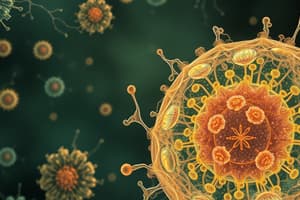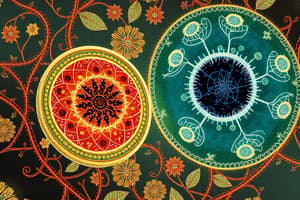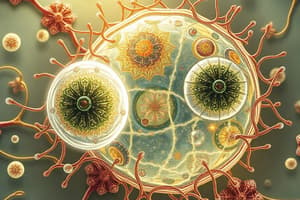Podcast
Questions and Answers
Which of the following are characteristics of prokaryotic cells?
Which of the following are characteristics of prokaryotic cells?
- Lack a nucleus (correct)
- Replicate via mitosis
- Have a defined shape due to a cell wall (correct)
- Contain membrane-bound organelles
What is the primary function of the Golgi apparatus?
What is the primary function of the Golgi apparatus?
- Modification and packaging of proteins (correct)
- Photosynthesis
- Site of protein synthesis
- ATP production
Which cellular process occurs first in the cell cycle?
Which cellular process occurs first in the cell cycle?
- Mitosis
- G1 phase of Interphase (correct)
- G2 phase of Interphase
- Cytokinesis
What role do ribosomes play in a cell?
What role do ribosomes play in a cell?
Which type of transport mechanism requires energy?
Which type of transport mechanism requires energy?
What process involves the building of complex molecules from simpler ones?
What process involves the building of complex molecules from simpler ones?
Which type of cell is responsible for signal transmission?
Which type of cell is responsible for signal transmission?
What is the term for the process of programmed cell death?
What is the term for the process of programmed cell death?
Which technique is commonly used to observe cell structure at a high resolution?
Which technique is commonly used to observe cell structure at a high resolution?
What is the primary purpose of cell culture in research?
What is the primary purpose of cell culture in research?
Flashcards are hidden until you start studying
Study Notes
Cell Biology
Basic Concepts
-
Cell Theory:
- All living organisms are composed of cells.
- The cell is the basic unit of life.
- All cells arise from pre-existing cells.
-
Types of Cells:
-
Prokaryotic Cells:
- Lack a nucleus and membrane-bound organelles.
- Example: Bacteria and Archaea.
-
Eukaryotic Cells:
- Have a nucleus and membrane-bound organelles.
- Examples: Animal cells, plant cells, fungal cells, and protists.
-
Cell Structure
-
Cell Membrane:
- Phospholipid bilayer with embedded proteins.
- Functions: Protection, transport, communication.
-
Nucleus:
- Contains genetic material (DNA).
- Surrounded by a nuclear envelope.
-
Organelles:
- Mitochondria: Powerhouse of the cell; site of ATP production.
- Ribosomes: Sites of protein synthesis; can be free-floating or attached to the endoplasmic reticulum.
- Endoplasmic Reticulum (ER):
- Rough ER: Studded with ribosomes; involved in protein synthesis and processing.
- Smooth ER: Lacks ribosomes; involved in lipid synthesis and detoxification.
- Golgi Apparatus: Modifies, sorts, and packages proteins and lipids for secretion or delivery.
- Lysosomes: Contains digestive enzymes to breakdown waste.
- Chloroplasts (in plant cells): Site of photosynthesis; contains chlorophyll.
Cellular Processes
-
Cell Cycle:
- Stages: Interphase (G1, S, G2) and Mitosis (prophase, metaphase, anaphase, telophase) followed by cytokinesis.
- Regulation by checkpoints to ensure proper division.
-
Cell Communication:
- Mechanisms include direct contact, chemical signals (hormones), and neurotransmitters.
-
Transport Mechanisms:
- Passive Transport: Movement of substances across a cell membrane without energy. Types include diffusion, osmosis, and facilitated diffusion.
- Active Transport: Movement of substances against their concentration gradient using energy (ATP).
Cell Specialization
- Cells differentiate to perform specific functions (e.g., muscle cells for contraction, neurons for signal transmission).
- Stem cells have the potential to become various cell types.
Cellular Metabolism
- Anabolism: Building complex molecules from simpler ones (requires energy).
- Catabolism: Breaking down complex molecules into simpler ones (releases energy).
Apoptosis
- Programmed cell death; a controlled process essential for development and maintenance of tissue homeostasis.
Important Techniques
- Microscopy: Light and electron microscopy for observing cell structure.
- Cell Culture: Growth of cells in a controlled environment for research and medical applications.
These notes provide a foundational understanding of cell biology, focusing on structure, function, and processes within cells.
Basic Concepts
- Cell Theory encompasses three fundamental principles: all living organisms are made of cells, cells are the basic unit of life, and cells arise from pre-existing cells.
- Prokaryotic Cells: Simple structure, lack nucleus and membrane-bound organelles; examples include bacteria and archaea.
- Eukaryotic Cells: Complex cells with a nucleus and organelles; found in animals, plants, fungi, and protists.
Cell Structure
- Cell Membrane: Composed of a phospholipid bilayer embedded with proteins; crucial for protection, substance transport, and cell communication.
- Nucleus: Houses genetic material (DNA) and is encased in a nuclear envelope.
- Mitochondria: Known as the cell's powerhouse; responsible for ATP production through cellular respiration.
- Ribosomes: Sites for protein synthesis, can exist as free-floating units or attached to the endoplasmic reticulum.
- Endoplasmic Reticulum (ER):
- Rough ER: Contains ribosomes; critical for protein synthesis and processing.
- Smooth ER: Lacks ribosomes; involved in lipid synthesis and detoxification processes.
- Golgi Apparatus: Functions to modify, sort, and package proteins and lipids for secretion or delivery to other cell locations.
- Lysosomes: Organelles containing digestive enzymes that break down waste and cellular debris.
- Chloroplasts: Found in plant cells; site of photosynthesis and contains chlorophyll, vital for capturing light energy.
Cellular Processes
- Cell Cycle: Comprises stages including Interphase (G1, S, G2), Mitosis (prophase, metaphase, anaphase, telophase), and ends with cytokinesis; tightly regulated by checkpoints.
- Cell Communication: Achieved through direct contact or chemical signals such as hormones and neurotransmitters, allowing cells to respond to their environment.
- Transport Mechanisms:
- Passive Transport: Movement across the cell membrane without energy; includes diffusion, osmosis, and facilitated diffusion.
- Active Transport: Requires energy (ATP) to move substances against their concentration gradient.
Cell Specialization
- Cells differentiate into specialized types to perform specific functions, such as muscle cells for contraction and neurons for signal transmission.
- Stem Cells: Unique cells with the potential to develop into various cell types, playing a crucial role in growth and healing.
Cellular Metabolism
- Anabolism: The process of building complex molecules from simpler ones; requires energy input.
- Catabolism: Involves the breakdown of complex molecules into simpler ones, releasing energy.
Apoptosis
- Refers to programmed cell death, a controlled mechanism essential for proper development and maintaining tissue balance.
Important Techniques
- Microscopy: Utilizes light and electron microscopy to examine cell structure in detail.
- Cell Culture: Involves growing cells in a controlled environment for research and medical applications, crucial for understanding cellular behavior and development.
Studying That Suits You
Use AI to generate personalized quizzes and flashcards to suit your learning preferences.




